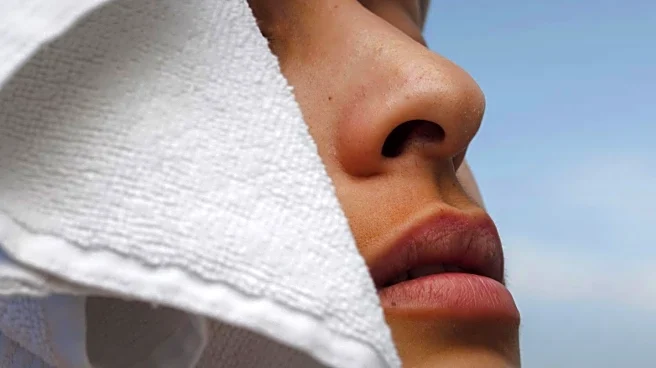What's Happening?
A recent study highlights the effectiveness of ORLADEYO, an FDA-approved oral prophylactic treatment for hereditary angioedema (HAE), in reducing healthcare visits. HAE is a rare disease characterized
by recurrent swelling attacks, affecting approximately 1 in 50,000 people in the U.S. The study, using real-world data, showed that patients on ORLADEYO experienced significant reductions in HAE attack rates over 18 months. The treatment led to a 34% decrease in all-cause hospitalizations and a 14% decrease in outpatient or emergency department visits. Additionally, there was a 60% reduction in HAE-related hospitalizations and a 50% decrease in outpatient visits. ORLADEYO, available since 2020, is used for patients aged 12 and older to prevent HAE attacks, though it is not approved for acute attack treatment.
Why It's Important?
The findings underscore the potential of ORLADEYO to alleviate the burden on the healthcare system by reducing the frequency of hospital visits and improving the quality of life for HAE patients. This is significant as rare diseases like HAE pose a substantial burden comparable to major conditions such as cancer and heart failure. The reduction in healthcare resource utilization not only benefits patients by minimizing hospital stays and medical interventions but also offers economic advantages by lowering healthcare costs. The study supports a holistic approach to HAE care, emphasizing the importance of long-term prophylactic treatments in managing chronic conditions effectively.
What's Next?
The study's results may influence healthcare policy and insurance coverage decisions, potentially leading to broader access to ORLADEYO for HAE patients. As the treatment demonstrates both clinical and economic benefits, stakeholders, including healthcare providers and insurers, might consider integrating such prophylactic treatments into standard care practices. Continued research and real-world evidence generation will be crucial in further validating the long-term benefits of ORLADEYO and similar treatments, potentially paving the way for advancements in managing other rare diseases.









